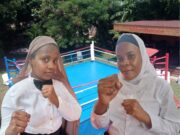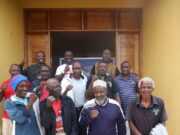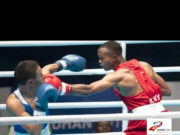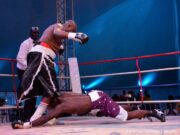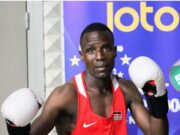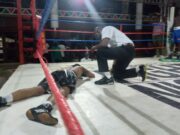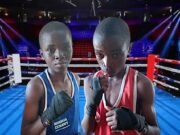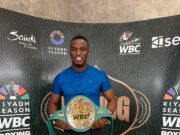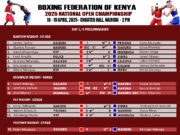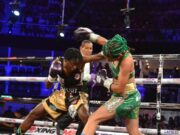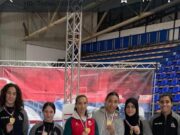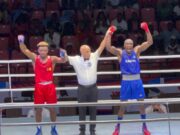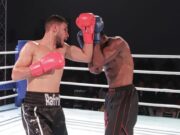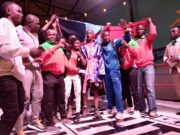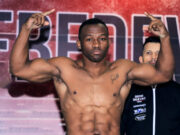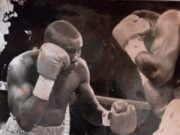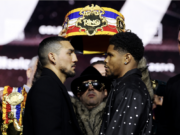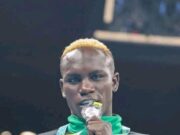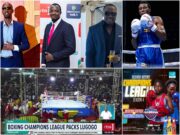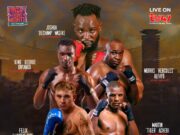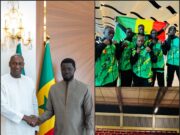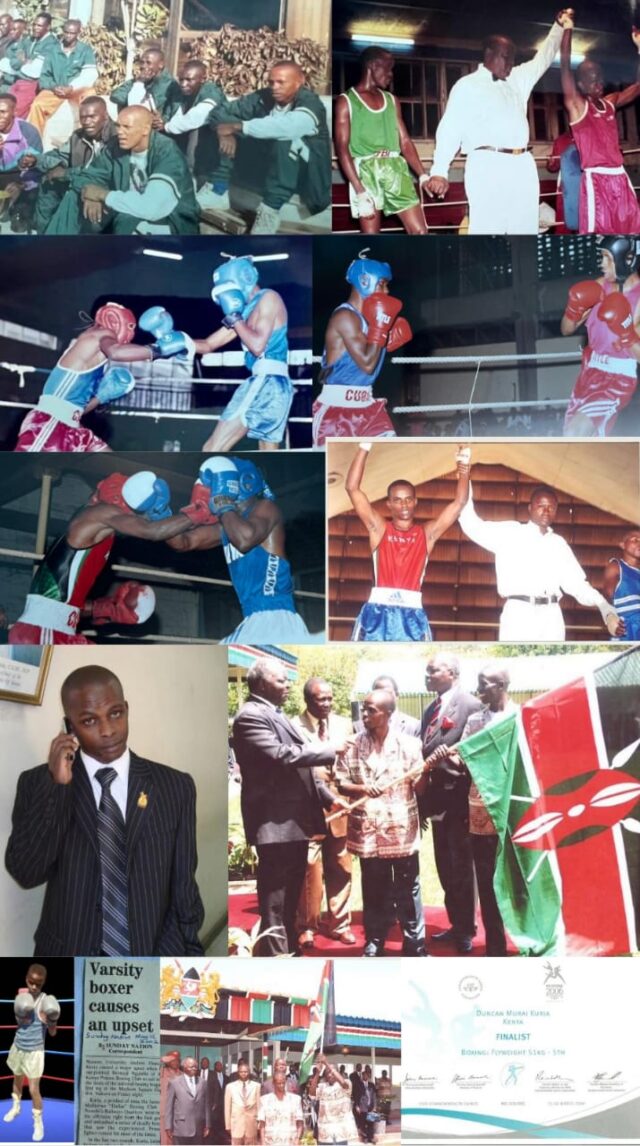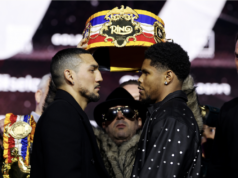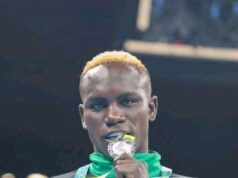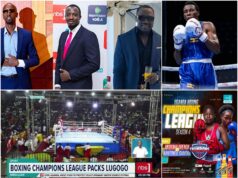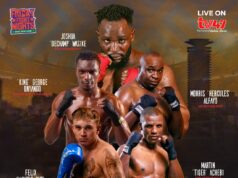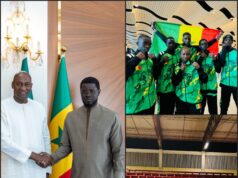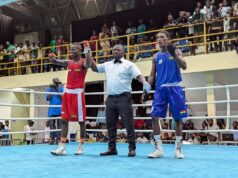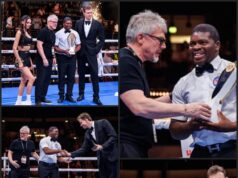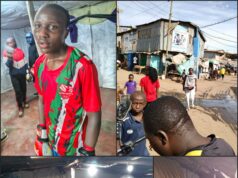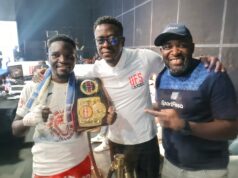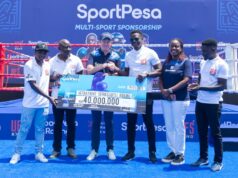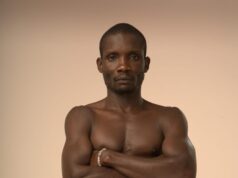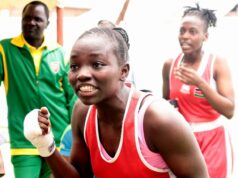Korean tycoon Ansano Lee was so impressed by the_ _potential of Duncan Kuria that he decided to give him a boxing scholarship with Suleiman Bilali to study in Seoul
One evening in 1993 at Muthurwa Dallas Gym in Kenya’s capital city Nairobi, the fortunes of a talented junior boxer changed drastically. He never expected this grand plan in his life with his buddy Suleiman Bilali also brought on board.
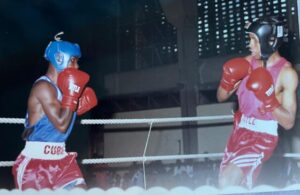
It was just another normal training session at Dallas for Duncan Kuria aka Sugar Ray and his comrades after their fine show in the National Junior Championships at Jericho Social Hall.
I had been there a day earlier to inform Kuria and coach Patrick “Madd” Okoth I’ll be visiting them with a South Korean billionaire Ansano Lee who was in Nairobi to lay the groundwork for a major pro boxing plan.However I didn’t inform them what Ansano Lee had in store for them.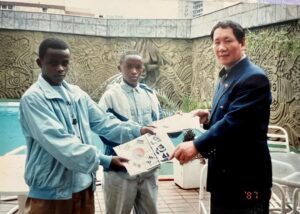
Ansano Lee also wanted to groom junior boxers into world champions through a boxing scholarship programme which would have enabled Kuria and Bilali to study and engage in boxing at the same time in Seoul.
The plan fitted perfectly with Kuria’s dream because he valued his education a great deal.
Kuria impressed me during the National Junior Championships which I covered for the KANU-owned newspaper, _KENYA TIMES_ .
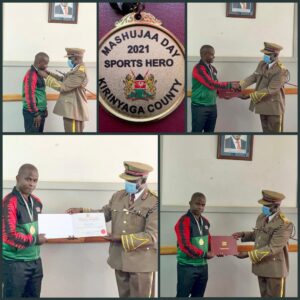
He put up a dazzling display of speedy repertoire of punches, beautiful footwork and superb timing to outpoint Kisumu’s Dennis Aboy in the finals of the 39kg category.
“Aboy had knocked out all his opponents but I showed him dust. He really believed he was better than me but after the fight he acknowledged I was the best,” Kuria told boxersworld.co.ke in an exclusive interview.
What hardened Kuria is the sparring sessions he had with senior experienced boxers at Dallas such as James Wanene, and picking tips watching top international boxers, David “Harish” Ouma, Nasser “Silencer” Athumani and Aloice “Lesles” Muiruri, sparring at the Dallas Gym.
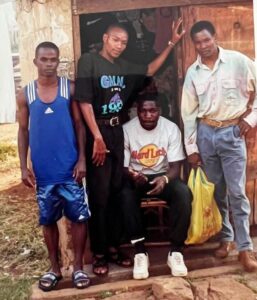
“I was very observant and could watch closely great boxers training in Dallas the likes of the late David “Harish” Ouma who was very stylish, Aloice “Lesles” Muiruri, Duncan Karanja, Nasser Athumani. I copied different styles from these boxing technicians, so my agemates could not cope with the skills I had developed ”
At the National Junior Championships, Kuria’s immaculate performance showed he is a hugely talented boxer displaying exceptional speed, power and agility along with a keen understanding of the sweet science.
His ability to remain focused under pressure, overcoming adversity and maintaining a strong will to win at only 12 years made the Amateur Boxing Association (ABA) officials to sit up and take notice.
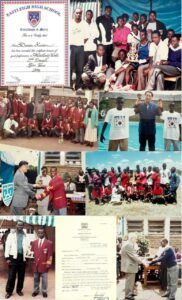
Even the chairman of ABA’s Nairobi branch Reuben Anjeo was mesmerised by Kuria’s boxing skills. So were the ABA officials, national team head coach Peter Mwarangu, Charles Anjimbi, Public Relations Officer David Njenga and treasurer Stanley Wachanga.
The ABA revived the junior tournament in 1993 at a time when Kenya’s boxing standards had nosedived resulting in a dismal performance at the annual King’s Cup in Bangkok, Thailand, where for the first time the national team returned home empty-handed. Kuria’s glowing show was indeed the tonic the ABA officials needed to inject new blood in the national team.
In addition to Kuria, among other junior boxers from Dallas who shone were Suleiman Bilali and David Munyasia.
Therefore when Korean tycoon and promoter Ansano Lee – himself a former prominent pro boxer in Asia – asked me to take him to a gym loaded with talent, Dallas was the place to be having watched Kuria and comrades excel in the junior event at the Jericho Social Hall.
The ragged gym with only two punching bags and no ring was packed when I arrived with Ansano Lee. I introduced him to my good buddy coach Patrick “Madd” Okoth and young Kuria, the Dallas gem whose amiable nature, charm and captivating personality were essential ingredients for media attention.
After watching the sparring sessions, Ansano Lee settled for Kuria and Bilali. Then came the big news: mThey’ve been picked for a boxing scholarship to study and engage in boxing in South Korea’s capital city, Seoul.
Smiling faces from all the boxers greeted Ansano Lee’s announcement. It’s a day they would remember for the rest of their lives.
To put the icing on the cake, Kuria, Bilali and coach Okoth were each given Ksh 2000 each.
“That was a lot of money in 1993 I gave the whole amount to my mum, she couldn’t believe it,” recalls Kuria who the following day was invited by the Korean to the prestigious Nairobi Safari Club Hotel with Bilali.
“I vividly remember we went to Nairobi Safari club for lunch, Ansano wanted us to stay there with him. Waaa!!. You can imagine being in primary school and then you are on the back of all newspapers that you are going to South Korea! It was a big deal and having lunch at such a famous and expensive hotel.”
By then he was a class seven pupil at Muthurwa Primary School. Focus was now in South Korea as Kuria sat for his Certificate of Primary School examination in 1994 , emerging as the top performer at Muthurwa Primary School with 494 points and was admitted to Eastleigh High School in 1995 but he knew he would be there briefly and then travel to South Korea. Ansano Lee gave me the heavy responsibility of accompanying Kuria and Bilali to Seoul and then later be in charge of a multipurpose gym and hotel he was intending to construct in Nairobi.
“When I was joining high school instead of two pairs of uniform, my mum bought one pair because we knew I would be travelling to South Korea to study and train in modern facilities in the world,” says Kuria whose friend Bilali joined the General Service Unit (GSU) on dropping out of school due to lack of fees following the collapse of the Korea scholarship plan.
A lukewarm response from the Amateur Boxing Association of Kenya and in-fighting among the Koreans themselves, dishonesty and lust for money brought the deal to a screeching halt. Ansano Lee returned to Seoul a disappointed man and from then on we hardly communicated.
“I believe the ABA officials then messed up the scholarship deal by insisting that Ansano Lee gives them money they educate us in Kenya arguing we were too young to travel to Korea yet our parents did not object.”
The ABA was then led by John Roberts who declined to comment further on the Korea deal. I’m reliably informed Roberts is now settled at home
Education was key to Kuria’s vision in life much as he was a talented boxer and would have joined Kenya Police who had promised him a job while in high school. Had the Seoul deal succeeded, Kuria and Bilali would have probably been millionaire world champions.
Kuria explains why he took his education seriously.
“I was blessed with huge boxing talent. I saw a lot of top boxers going through serious challenges in life out of decisions they were making. I decided to make a difference by taking lessons from them and making better decisions pertaining to my life. That’s how I managed to combine education with boxing successfully. There were some boxers who thought I was wasting time by focusing on education but now most of them call me “mdosi” or “boss” when they can hardly gain employment because they only relied on boxing and when they stopped fighting, they realised they have no other skills to help them in life after boxing. It hurts to meet some of them that are not doing so well in life for lack of requisite skills. It’s difficult to assist them meaningfully.
“Once I joined Eastleigh High School, I used to train to keep fit but wouldn’t travel for tournaments to avoid missing classes. I was a monitor from form one to form three, and then I became school captain in form four (Head Boy). I also did well in athletics specialising in 1500m and 800m and received certificates as the cleanest student.
“I was good in Chemistry, Biology, History and Commerce. I balanced the subjects very well. The lowest grade I got in a subject was B- in Kiswahili.”
Kuria excelled in his Kenya Certificate of Secondary Education in 1998, passing with an impressive B+ after which he resumed boxing fulltime.
“During our time we were staying two years out before joining University. So after my form four exams, immediately I went back to boxing and was employed by Kimbo (East African Industries) because they wanted me to represent them. I worked at Kimbo briefly then joined Kenya Railways permanently after winning 1999 Kecoso Games in Nakuru where I was voted the best boxer. I remained an employee of Kenya Railways even after joining Maseno University.”
Kuria’s Kecoso triumph marked the beginning of his reign of terror in the flyweight division, hammering some of Kenya’s best boxers in the division. He was at first a footballer representing and captaining Dallas FC before the boxing bug caught up with him given that Dallas was like a boxing factory in Kenya producing renowned boxers such as Steve Muchoki, his younger brother Mike Irungu, David Ouma aka Professor or Harish if you like, Ali “Ojukwu” Athumani and his younger brothers Nasser and Yahya Mwami “Chuchu” and Aloice Muiruri to mention but a few.
He got involved with boxing in 1991 training alongside Police Boxing Club aka Chafua Chafua and Kenya Railways.
“They were all training in our local gym in Dallas, I used to watch their training sessions, imitating their moves and skills. At times top boxers like 1990 Commonwealth Games heavyweight gold medalist George “Foreman” Onyango could ask me to punch his tummy as he works on his footwork, also Hit Squad used to come train in Dallas occasionally under our coach Patrick “Madd” Okoth, not forgetting the estate had produced so many international champions whose success we associated with since we were from the same hood. That’s what made me develop keen interest in boxing.”
Kuria further narrates his progress in boxing mentioning his first coach.
“My first coach was Patrick “Madd” Okoth. He was a very strict coach when it came to training and since I lived a few meters from the gym, I could see boxers hiding away from the coach especially when they were smoking cigarettes or chewing miraa. Out of observing top boxers training it was very easy for me to apply different skills when I started serious training. It didn’t take long before they nicknamed me Sugar Ray after my American idol Sugar Ray Leonard. I could “float and sting like a bee”.
“I then started taking part in special contests, it’s like I became a good omen for Chafua Chafua then because I was always opening their matches and winning my special contests. It now became a tradition to feature in special contests whenever Kenya Police had a match, my main opponents were Mwendwa Kasina and Walter Imbayi from Maringo Posta son to the late coach Joseph Onyango of Posta. Mwendwa was my gym mate, I fought with him about 15 times winning all of them.”
I ask Kuria who were among his peers at the time?
“My peers were Mwendwa Kasina, David Munyasia, Dick Otieno, Suleiman Bilali, Daniel Shisia among them. Without a doubt I got a lot of inspiration from top boxers who were world beaters with whom we trained together such as Nasser “Silencer” Athumani, David “Harish” Ouma, Aloice “Lesles” Muiruri, Charles Ojwang, James Wanene, Duncan Karanja, Benjamin Ngaruiya. The success of boxers from the hood in major international championship such as Steve Muchoki (world champion), Ibrahim “Surf” Bilali (Olympic bronze medallist), together with several Commonwealth Games gold medallists among them Michael Irungu “Stone” is a major inspiration for boxers from Dallas. Ali “Ojukwu” Athumani, who was coaching Police those days together with Patrick “Mont” Waweru, is one of my mentors.
David Munyasia, one of Kuria’s peers, shares his insight on the potential of their tormentor at Dallas Gym..
“Sugar Ray was a very good boxer with hand speed and combination of punches but it was not that easy for him to be declared a winner against me, it was fire!, I was named his sparring partner in 1999 for the African Games after he defeated me in Nakuru. Maximum respect to Sugar Ray my big brother in the Dallas boxing family.”
Munyasia says their sparring sessions were fierce fights with Kuria taking them to school every day.
“Sugar Ray was bad news during our sparring sessions in Dallas, punching us hard that when he goes to the gents I follow him. In a low tone I tell him to take it easy but when we resume sparring it’s war again but he hardened us I thank him for that.”
On his way to the top, Kuria picks out his highlights in local boxing.
“To be the best you have to beat the best. I remained unbeaten for several years from my days as a junior. I fought against immediate former Hit Squad captain Nick Okoth in Kecoso Games 2003 beat him clean including his namesake Nick Abaka whom I stopped in the second round at Pal Pal Gym in the Nairobi Junior tournament.
“I also beat Bernard Ngumba three times one of the victories in the national league in Nakuru in the semi-finals in 2002. In the final I lost to Suleiman Bilali on split points. We had agreed with Bilali that we would not fight since we were like brothers and spent the better part of the day with him, so when it came to game time his coaches insisted that we had to fight. That caught me by surprise so technically I was not psychologically prepared for the fight which I ended up losing 3-2.”
One of Kuria’s big wins was in 2006 against the stubborn Sammy Magima of KDF whom he beat on points to further reinforce his status as the top flyweight in the country. He describes Magima as his toughest opponent he met in Kenya.
“Magima really gave me a hard time, he was a good boxer, taller and knew how to utilize his height advantage but still I defeated him in a league match at Borabora Hotel in Kawangware. I represented Prisons.”
Kuria joined the national team in 1999 after winning the Kenya Open flyweight title at the Nyayo Stadium Gymnasium. He represented Kenya in the Zone 5 Championships in Cairo, Egypt, settling for a silver medal. From Cairo the next stop was in Johannesburg, South Africa, for the African Games. He lost in the quarter-finals.
He then joined Maseno University in 2000, studying Bachelor of Arts in Urban & Regional planning.
“It wasn’t easy combining boxing with studies but through dedication and discipline I’m grateful to God I successfully combined both.”
PUpon his graduation in 2005, he fully resumed boxing, punching his way to the 2006 Commonwealth Games in Melbourne where he lost in the quarters to a Ugandan boxer.
“I captained the national team Hit Squad, and I was also the overall deputy captain of the Kenya team in the Commonwealth Games. One of my fond memories in Melbourne was being selected to represent Africa at a luncheon with Queen Elizabeth.”
Kuria currently works as a Director of Physical Planning in Vihiga County in Western Kenya and also serves the Boxing Federation of Kenya as their Communication Director.
What’s his parting shot to Kenyan boxers?
“The importance of boxers pursuing education and sport simultaneously cannot be overstated. The world has changed a great deal, the era of sportsmen and women securing jobs by virtue of talent alone is long gone. We are in the digital world now, our boxers must acquire different skills to enable them to be productive in the corporate world.
“Today even jobs which previously didn’t require academic papers such as in the forces they now require minimum academic grades which goes into emphasizing the significance of proper education.
“This applies to the coaches also. They need to be role models to the upcoming boxers so that it can be easy for the youngsters to emulate their lifestyle in sports and also outside sports. This can be done by having capacity building courses for coaches so that they can have the right basics to guide the young boxers. It’s not good to have coaches who can’t speak and write English yet we know IBA courses are offered in English. Having a coach who can’t read or write in English is something that needs to be addressed so as to ensure the youngsters get the right information as they develop in boxing otherwise it’s pointless to have coaches with poor communication skills.”
Kuria also suggests the need for workshops to prepare boxers on life after boxing as well as advising them on how to invest so that they have a fallback plan on quitting boxing to avoid becoming a burden to the society and their families.


